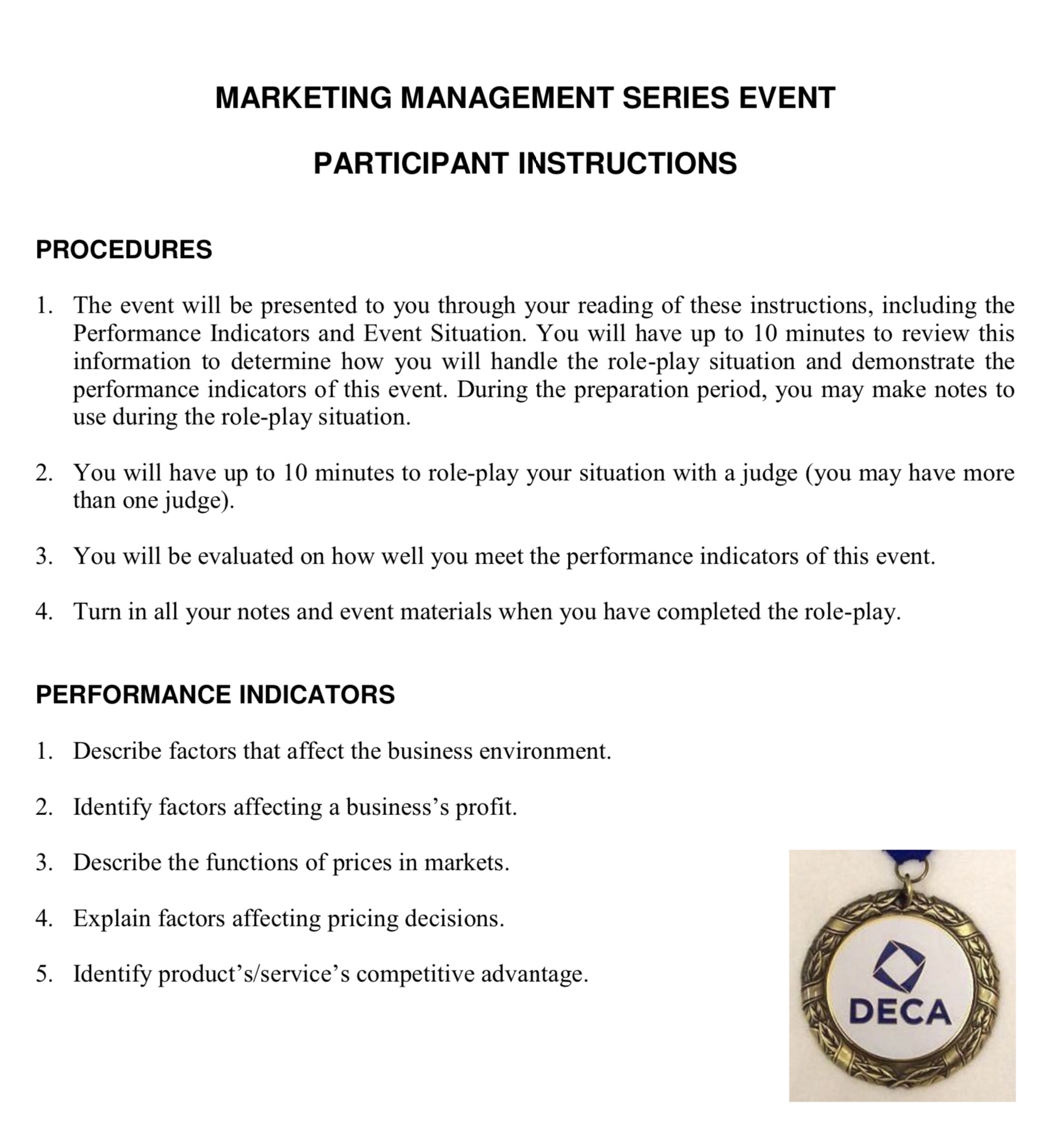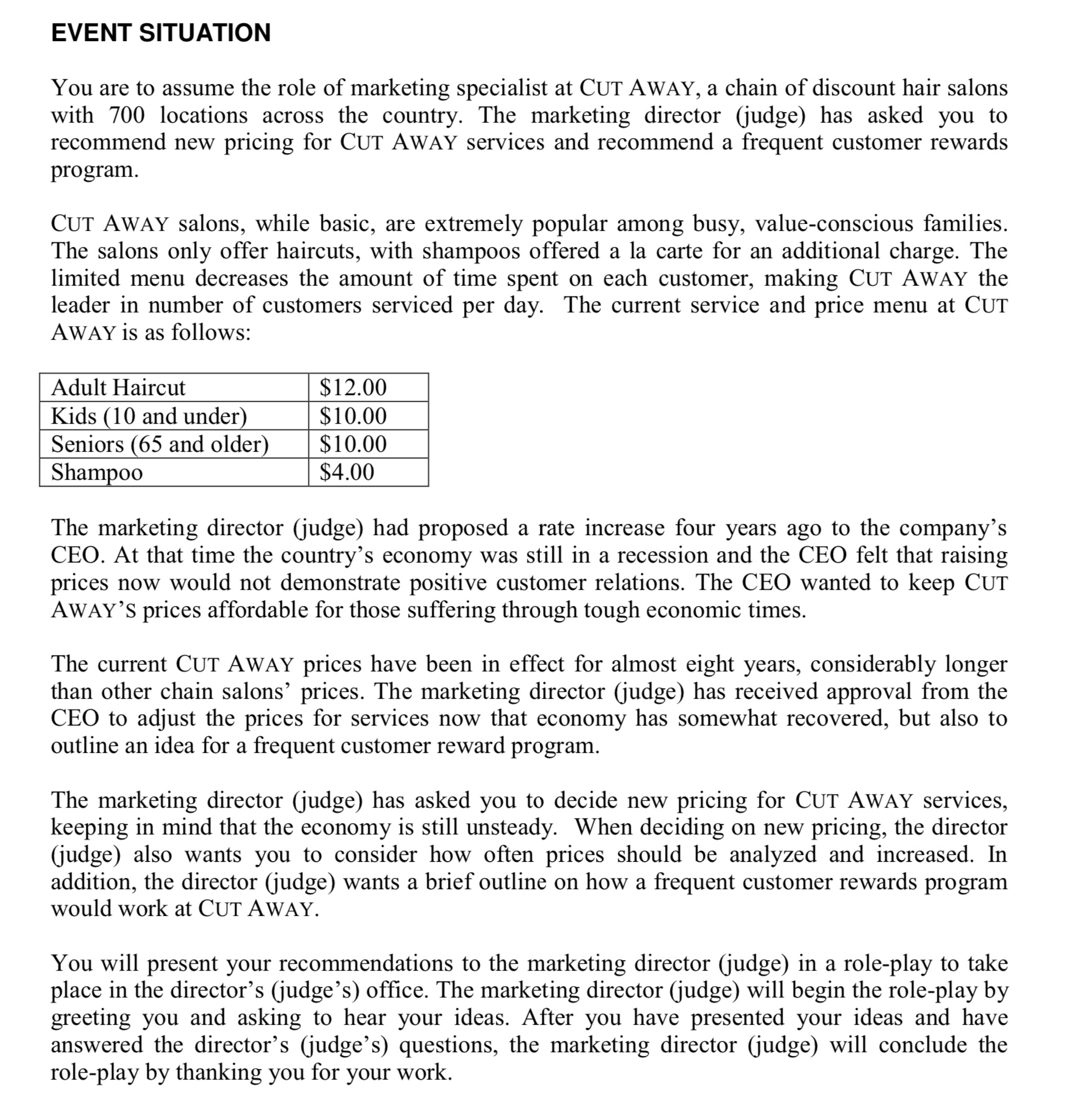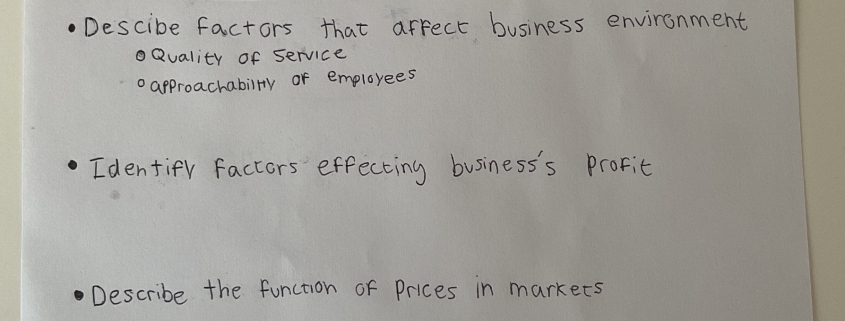How to Master DECA Role-Plays – taking notes, performance indicators, strategies
When I first joined DECA, I had absolutely no clue what a role-play was! Not only can role-plays seem confusing at first, but they can be extremely intimidating. In this guide, I will teach you tricks that helped me navigate and master DECA role-plays that won me multiple regional and state awards.
Role Play Basics
In simple terms, role-plays are you being given a problem or a change within a business, and then telling a judge your solutions to the problem or change. Role-plays are typically 2 pages long – the first page contains guidelines and performance indicators (we will get to those later), and the second page contains information about the business and its problems. You are assigned a roll in this business – for instance a marketing specialist – and have to act as the role. You are typically given 10 minutes to read the roll-play and take notes, and 10 minutes to present to the judge.
Here is a sample role-play. I highly recommend reading the role-play, as I will be referring to it later. This role-play is in the principles of marketing cluster, an event for first-year DECA participants only.


As you can see, the first page has participant instructions and 21st century skills (I usually skip these over), and performance indicators. In this situation, you are a marketing specialist at Cutaway, a large hair salon chain. As you can see, the marketing director (judge) wants to increase prices while maintaining affordability. You talk to the judge about a plan to increase prices and create a customer rewards program. Once you really break down a role play, it isn’t difficult. You get to showcase your creativity to think of solutions to a problem or change in a business.
Choosing your Cluster
There are so many different clusters of role-plays to choose from! The main clusters include business management+administration, entrepreneurship, finance, hospitality and tourism, and marketing. Under each of these main clusters there’s dozens of different events to choose from. If you want to see all of the events check out https://www.deca.org/high-school-programs/high-school-competitive-events/ It is important that you choose a cluster that you are familiar with, so that you are able to present with confidence. Additionally, there are several “principles” events for first-year DECA participants that are events that cover easier and more basic business content. I highly recommend that if you are a first-year DECA participant you choose these events, as it gives you a competitive advantage. Rather than competing against all DECA participants, you will only be competing against first-year competitors. If you are unsure of what cluster you would do best in, you can read sample role-plays. Simply search “DECA role plays in _ cluster” and several sample role-plays will come up. Reading sample role plays can help you familiarize yourself in the content each cluster covers.
Performance Indicators
On the first page of the sample role play, you can see 5 performance indicators listed. Performance indicators are basically the topics you have to cover/answer when talking to the judge. Think about if you were given a math problem. Under the problem there would be a part A, part B, etc., but it would still be the same overall math problem through all the parts. With roll plays, you are responding to the main prompt, but weaving in the “performance indicators”, similarly to answering different parts of a math problem. You can also think of performance indicators as if they are word-bank of words you have to include in a writing prompt. Instead of words, these are concepts that you have to cover in your presentation.
In this role-play, the 5 performance indicators are:

As you can see, there may be some unfamiliar words or concepts. Even if you do not know the words or concepts, you just have to take a guess and find a way to incorporate them in. A lot of DECA is simply “BS-ing”. Even if you have no idea what you are talking about, if you say something confidently, a lot of the time the judge will give you points. It is extremely important you talk about all of the performance indicators, as they are a big portion of the judge’s rubric.
Speaking on the Spot
One of the scariest parts of role-plays is having to think of a 10 minute response in a short amount of time. I can assure you, the more you practice, the easier it gets. Although 10 minutes to read a prompt and take notes sounds like a short amount of time, you find that it is more than enough. With speaking on the spot, you may find that some ideas aren’t fully developed or as elaborate as you’d like. This is a reality outside of the DECA world – for future job interviews, you will not get time to construct the perfect response to a question. Even if your ideas are a little bit rough, you have to convey them with enthusiasm and confidence. I guarantee you, if you continuously practice, you will get used to speaking on the spot with confidence.
You also want to make sure that you talk for as long as possible. You are given 10 minutes – use those minutes! The more time you take, the more in depth you can go. Make sure you leave a minute or two at the end for questions. It really helps to practice and set a timer so that you can get the feel of 10 minutes.
Taking Good Notes

Above is a picture of the way I typically take notes. Taking notes can really vary from person to person, however my way is typically the most common. Before even reading the role play, I copy down the performance indicators as seen on the bottom half of the notes sheet. I then make a box in the corner and write down my roll, the judge’s roll, and the company name. Doing this has saved me numerous times from blanking out on the basics. I then write down other key information. I typically only do 4 or 5 bullet points, as you do not want to waist too much time doing this. Repeating key information and facts to the judge helps convey that you are detail oriented. I then write down bullet points under each performance indicator of things I can talk about and incorporate. You want to add as many ideas as possible to this section, as it is worth the most points. I highly recommend practicing taking notes so that you can get more comfortable.
Role Play Presenting Skills
As important as your ideas are, it is also extremely important to have strong roll play presenting skills. I’ve seen people with incredible ideas do not as well as they liked simply because their presenting skills were not great. While presenting, the first thing you typically do is give a hand-shake to the judge. Make sure that you are prepared for this, and meet the judge with a confident hand-shake. Additionally, make sure that you establish your position. For this roll play I would say something like, “Hi! I know that it is necessary that we increase prices at Cut Away, but obviously we really value maintaining affordability, so as the marketing specialist I am excited to share with you a new pricing plan and rewards program for our customers.” I established my position and what I would cover, while keeping it concise.
Next, you need to make sure that you maintain eye-contact. I know that it is SO INTIMIDATING and even uncomfortable to stare at a judge for 10 minutes, when you are already nervous and stressed. Although it is nerve wracking, maintaining eye contact really makes a difference. It conveys your confidence and professionalism and will get you presenting points. Additionally, you need to make sure to pace yourself well. Lots of students end up talking super quickly when presenting to the judge, due to their nervousness. Talking too quickly can end up causing the judge to not fully pick up and understand your ideas. While presenting, make a conscious effort to talk slowly and clearly. Finally, when concluding make sure to thank the judge for their time, and be prepared to answer questions. The judge will typically ask 1-3 questions, in which you need to instantly give a response. Again, although you may not have the perfect response, confidence is key.
Practicing Role Plays
The key to mastering role plays is lots of practice! Practice helps you familiarize yourself with roll plays, and improve on lots of skills needed. There are 3 ways I typically practice:
- Individually – practicing individually is super easy because you can do it anywhere and any way you want. Typically, I print out a role play, I give myself a notes sheet and then I set a 10 minute timer. After the 10 minute note taking period, I present to myself. Presenting to myself allows me to strengthen my ideation skills in a low pressure environment. The downsides of individually presenting, is that having a judge hear your ideas is really beneficial.
- With a friend or adult – my favorite way to practice role plays is with a friend or adult. If I’m practicing with a role play we each take turns taking notes and presenting. If I’m practicing with an adult, I simply have them listen to me. Presenting in front of a friend or adult simulates the pressure of presenting in front of a judge. Additionally, they can give you advice on how to improve your presenting. Sometimes, friends and I just take a roll play and brainstorm creative solutions for the roll play.
- Recording myself and rewatching – one of the most beneficial ways to practice role plays is to record myself and then rewatch. Rewatching is super helpful, because it helps you realize presenting quirks you may do. For instance you may say “like” or “um” a lot, avoid eye contact, or speak to quickly or slowly. These quirks are absolutely normal and inevitable – but becoming aware of them can help you minimize them. Additionally, when you record role plays, you can track progress and rewatch old ones.
No matter how you choose to practice, any practice you get is extremely beneficial!
DECA Vocabulary Words
One of the ways to make your role plays sound more sophisticated and developed is by using business vocabulary words and concepts. For instance, if you are in the marketing cluster you may want to use vocabulary words and concepts such as “SWAT analysis” and the “4 P’s”. These words and concepts will impress the judge and make you sound like you really know what your talking about. Since there are millions of different vocabulary words and concepts, I typically only memorize a handful, so that I am familiar with them in depth and can often incorporate them in. I highly recommend you at least learn a few words and concepts for your cluster. You can learn and practice words and concepts through programs such as Quizlet. They have dozens of existing study guides to business words and concepts in your cluster.
DECA Drawing
One of the most beneficial things you can do in a role play is create a drawing or graph when possible. Not many individuals are aware of this, but it really impresses a judge and adds depth to your presentation. You are typically given a blank sheet of paper. Use one side to take notes, and the other side to draw a quick graph or picture. In the sample roll play, it asks you to create a pricing plan for haircuts. I would draw a bar graph of the old and new prices, and then draw a quick sketch of the customer rewards programs. These drawings in no means have to be good – I would take as little time as possible drawing. Yet, a quick sketch really helps, and can keep you on track and help you remember what your talking about.
Role plays can seem confusing at first, but I guarantee you as you continue to practice they will get so much easier!
If you want to learn what happens during DECA competitions check out What Happens During a DECA Competition – Local, Regionals, State, Internationals
If you want to learn about other things you can do to get involved in business in high school check out 5 Things to Do in High-school if you want to Major in Business











Leave a Reply
Want to join the discussion?Feel free to contribute!